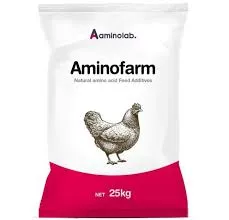
Okt . 17, 2024 10:10 Back to list
Albendazole Use in Poultry Farming for Enhanced Chicken Health and Growth
The Role of Albendazole in Poultry Farming
Albendazole is a broad-spectrum anthelmintic drug widely used in veterinary medicine to treat various parasitic infections in livestock, including chickens. This medication is particularly important in poultry farming, where parasitic diseases can significantly impact the health and productivity of flocks. Given the intensive nature of modern poultry farming, understanding the role of albendazole is crucial for farmers seeking to maintain optimal flock health and ensure sustainable production.
Understanding Albendazole
Albendazole belongs to a class of drugs called benzimidazoles, which work by inhibiting the growth and reproduction of parasites. It is effective against a variety of gastrointestinal worms, as well as some protozoa, making it a versatile option for poultry health management. Albendazole interferes with the parasites’ ability to absorb glucose, leading to their eventual death. Consequently, it helps reduce the parasitic load within a flock, enhancing the overall health of the chickens.
Importance in Poultry Farming
In poultry farming, the presence of parasites can lead to a range of health issues, including anemia, malnutrition, and decreased resistance to diseases. These conditions can result in poor growth rates, reduced egg production, and increased mortality, ultimately harming a farmer's profitability. By using albendazole as part of a comprehensive health management program, poultry farmers can significantly mitigate these risks.
Regular deworming with albendazole can help prevent the establishment of heavy infestations. Farmers often incorporate this medication into their flock management practices to ensure optimal growth and production levels. Furthermore, albendazole’s ease of administration—available in both feed and water formulations—makes it user-friendly for farmers, allowing for straightforward integration into routine health checks.
Dosage and Administration
albendazole chickens factory

The administration of albendazole in chickens should follow veterinary guidelines to ensure efficacy while minimizing the risk of resistance. Typically, the drug is given in doses based on the weight of the birds, and it is essential to follow the recommended dosage instructions carefully. Over or under-dosing can lead to ineffective treatment or the development of drug-resistant parasites, which presents a growing concern in the field of veterinary parasitology.
For best results, farmers should assess the specific needs of their flocks through regular veterinary checks. Moreover, monitoring for signs of parasitic infections—such as weight loss, lethargy, and poor feathering—can help determine when to administer albendazole.
Integration with Other Management Practices
While albendazole is effective, it should be used as part of a broader integrated pest management strategy. This approach includes maintaining good hygiene within the poultry facility, rotating grazing areas, and regularly checking feed and water for contamination. Additionally, implementing biosecurity measures helps prevent the introduction of parasites from outside sources.
Farmers should also consider periodic testing of their flocks to gauge infection levels and adjust treatment strategies accordingly. This proactive approach not only enhances the effectiveness of albendazole but also supports overall flock health.
Conclusion
The use of albendazole in poultry farming plays a critical role in managing parasitic infections and ensuring the health and productivity of chickens. As the poultry industry continues to evolve, the integration of effective medications like albendazole, combined with comprehensive flock management practices, will be essential for sustainable production. By prioritizing flock health, farmers can improve their operations, contributing to a more robust food supply chain while maintaining economic viability.
-
Quality Bacillus Coagulans BC30 Factory - Expert Production
NewsAug.02,2025
-
China Salivation AI with GPT-4 Turbo Features
NewsAug.01,2025
-
Epic Sepsis Factories: AI-Driven Detection with GPT-4 Turbo
NewsJul.31,2025
-
Acute Salpingitis and Oophoritis AI Factory
NewsJul.31,2025
-
Premium China Bacillus Subtilis Supplier & Factory Solutions
NewsJul.30,2025
-
Premium Avermectin Supplier in China | Custom Solutions Available
NewsJul.29,2025




